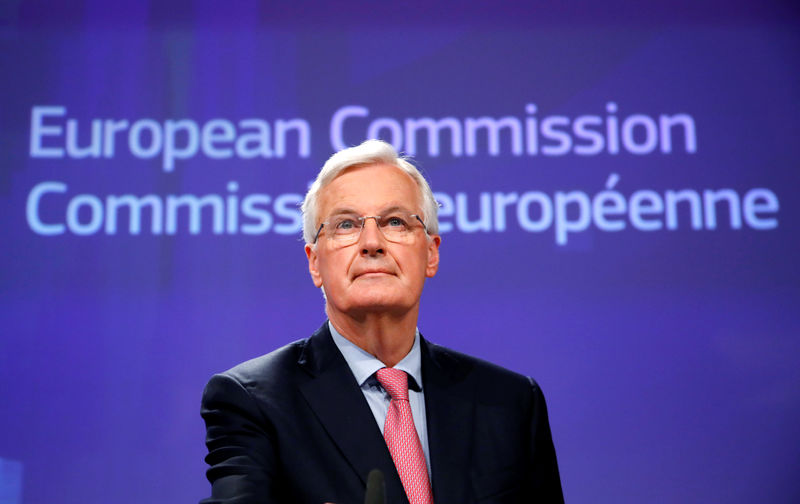By Alastair Macdonald and Philip Blenkinsop
BRUSSELS (Reuters) - EU Brexit negotiator Michel Barnier said on Friday a British proposal for avoiding border problems with Ireland after Brexit "raises more questions than answers" but was still welcome progress toward solutions.
A day after British Prime Minister Theresa May said she could keep the whole United Kingdom within the EU customs area for up to an extra year after Britain leaves in March, Barnier dismissed any time-limit. He also made clear he would not let London use an offer of special access to the EU market for produce from Northern Ireland to secure similar terms for all British goods.
"It is good to see the UK engaging with us by proposing text," Barnier told a news conference. But he later added: "I find that it raises more questions than answers."
Both sides want a deal by October to avoid barriers on the Irish land border that might fuel new conflict in the north.
But, with separate talks also starting on how a future EU-UK trading relationship may work, negotiations are deadlocked over how to achieve that while neither leaving a back door for British goods to enter the EU nor raising new hurdles for commerce between Northern Ireland and the British mainland.
Brussels has offered to keep the province effectively inside the EU single market for goods. Northern Ireland would remain in a "common regulatory area" with the EU, aligning local rules for farmers and manufacturers with those of the EU. It also said it would keep Northern Ireland inside the EU customs area.
The British proposal on Thursday was to extend the customs area to the British mainland. It did not mention the "regulatory alignment" of the whole of the UK with the EU - an idea that Barnier has ruled out since Britain will not follow EU rules.
May, who depends on a pro-British Northern Irish party for her parliamentary majority, insists there must also be no new barriers with the mainland. However, she agreed to the principle of this special "backstop" deal for Northern Ireland, insisting a better solution would be found once a broader EU-UK trade deal is done.
May told Sky News on the sidelines of a G7 meeting in Canada that Britain would sit down, talk with the EU and "deliver" and had done so in December and March despite prior scepticism.
"What my focus now is, on making sure that at the end in October, when we come together with the withdrawal agreement and our future relationship we have a good relationship for the future that is going to deliver for the British people," she said.
Her spokesman repeated her determination to avoid a customs border inside the United Kingdom after Barnier made clear the EU views that as a possibility. Checks on ferries between the mainland and Northern Ireland would be less disruptive, he said, than a "hard" land border and would mean only more regional devolution rather than threaten the integrity of the UK state.
May's Northern Irish allies called that "an outrageous attempt to revert to the annexation of Northern Ireland".
NOT RULING IT OUT
Barnier stressed he was not dismissing the British customs proposal, despite enumerating a series of technical questions which he said EU negotiators would be raising with London. But he did underline that the EU could not accept offering Britain the same "regulatory alignment" terms for easy access to the single market as it was offering to Northern Ireland.
"Let me be very clear. Our backstop cannot be extended to the whole UK. Why? Because it has been designed for the specific situation of Northern Ireland," he said.
"What does it do? Northern Ireland would form part of our customs territory. What is feasible for a territory the size of Northern Ireland is not necessarily feasible for the whole UK."
EU officials say they are concerned that London is trying to use negotiations on the Irish border backstop, which Barnier again said must be completed as part of a withdrawal treaty before Brexit, to leverage a better position in longer-term talks on future trade and gain a "back-door" into the EU market.
There must be no "a la carte" access to the single market, Barnier said, under which Britain could have access without applying EU rules including open access to EU immigration.
While welcoming the British proposal, Barnier took a swipe at reported comments from Brexit campaigner Boris Johnson, the foreign secretary, who spoke of a coming "meltdown" in talks as Britain fights to retain access to its biggest export market.
That sounded "paradoxical", Barnier said, reflecting "some kind of nostalgia" for EU membership among British ministers who wanted to keep the benefits without following the regulations.

That comment and a remark that there was much still to negotiate deflated sterling, which gave up gains and traded flat on the day at 87.84 pence to the euro.